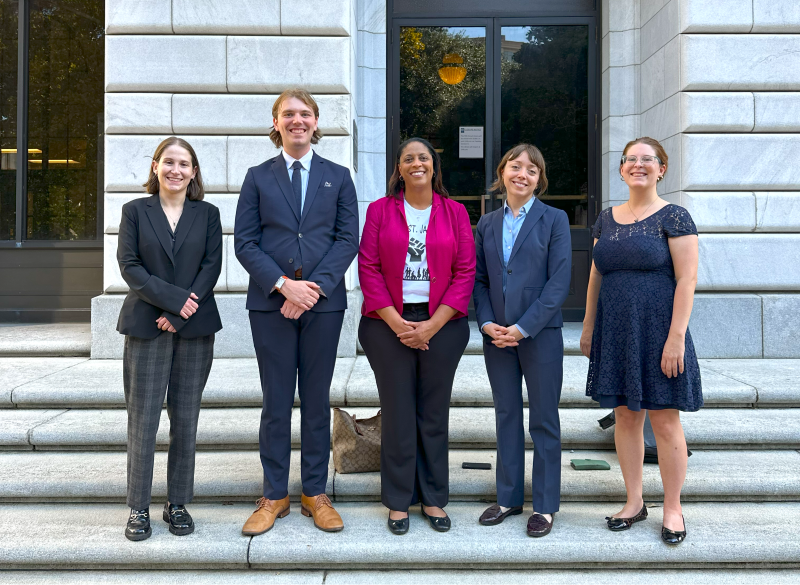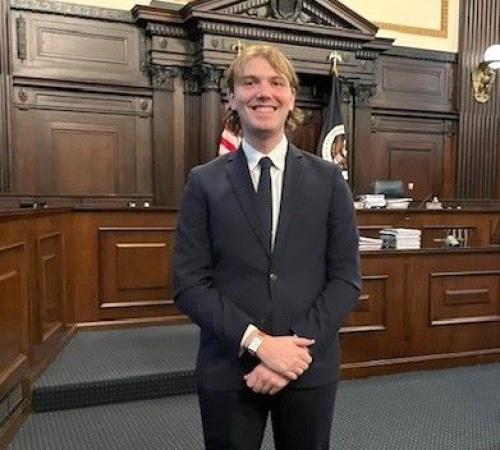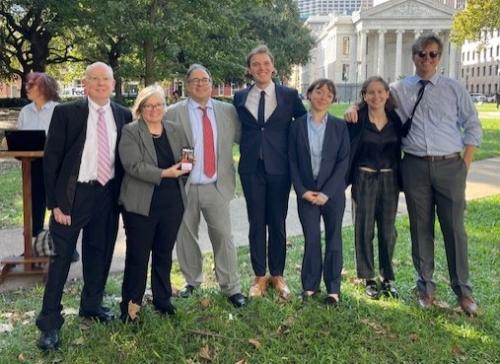Environmental Law Clinic students prepped for months to make case before federal appeals court
It took months of preparation, with their arguments mooted over the summer and into fall, but the Environmental Law Clinic at Tulane students working on behalf of residents of St. James Parish finally had the chance to put their client’s case before the U.S. Court of Appeal for the Fifth Circuit.
Third-year law student Jack Dean (L’25) argued on Oct. 7 alongside co-counsel from the Center for Constitutional Rights in Inclusive Louisiana v. St. James Parish that their clients – community groups in St. James Parish – have been harmed by the Parish’s practice, policy, and custom over decades of steering industrial facilities to areas with predominantly Black populations “while explicitly sparing White residents from the risk of environmental harm,” according to the lawsuit.
“Being in the Clinic and getting this kind of experience in particular was important to me. It literally pulled all my law school courses together, like the culmination of everything I have learned.”
Jack Dean , third-year Tulane Law student
“This is exactly why I came to Tulane Law,” said Dean, who wants to practice public interest law, especially environmental law. “Being in the Clinic and getting this kind of experience in particular was important to me. It literally pulled all my law school courses together, like the culmination of everything I have learned.”
Dean, as a student attorney in the Clinic, argued on behalf of community group RISE St. James, while the Center for Constitutional Rights represented two other organizations: Inclusive Louisiana and the Mount Triumph Baptist Church. The three community groups brought the original lawsuit against the Parish.
Dean and third-year law student Emma Sackheim partnered this summer – he preparing for the argument, she doing substantial legal research – to be ready for the hearing before the federal appeals court, which took the case after a lower court had dismissed it, largely on procedural grounds.
“I focused on research – which was key to the case,” said Sackheim (L’25). “This case is not just important for St. James Parish but could have impact on other courts and other frontline communities who need relief from these environmental injustices.”
When it came to preparation, the students “mooted” the case, meaning they made their arguments over and over before attorneys playing the role of Fifth Circuit judges, including law Professors Adam Babich, Erin Donelon (NC'94), Sally Richardson, and Vice Dean Stacy Seicshnadyre (L'92) as well as alumnus and adjunct professor Tad Bartlett (L'00), a former clinic student-attorney himself. Classmates in the clinic also held court, helping Dean focus the most pressing elements of his argument.
“Jack and Emma committed themselves tirelessly to the case,” said Clinical Assistant Professor Clara Potter, who supervised the students in the case. “It was exciting to see them both develop their legal instincts over the course of several months, honing their lawyering skills and grappling with difficult arguments. It is an honor and a pleasure to get to supervise their excellent work.”
The case has been several years in the making. Residents in 2023 sued the Parish arguing that it steers industrial projects to Black neighborhoods, resulting in higher cancer rates and other health issues, lowered property values and the destruction of religious sites, including the burial grounds of enslaved people. The groups argued the Parish’s action violates tenets of the Constitution against modern-day slavery and equal protections under the law, among other legal issues.
In November 2023, U.S. District Judge Carl Barbier of the Eastern District of Louisiana dismissed the suit mostly on procedural grounds, saying the community groups didn’t have standing to bring some claims, and for other claims had missed the statute of limitations – which he pinned to a Parish Land Use Plan enacted in 2014.
But during arguments before the federal appeals court, Judge Catharina Haynes questioned the Parish’s statute of limitations argument, saying it “basically makes it sound like if you didn’t sue within a year, well, heck, you can be discriminated against in a bunch of different ways for the rest of eternity.”
“I feel like we made the best argument possible and that we showed the court that at a minimum, this case has grounds to go forward,” Dean said.



